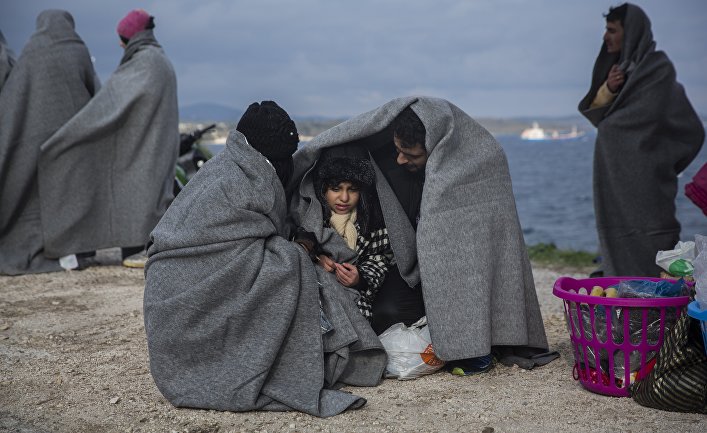“Our proposal involves the creation of three agreed zones in Syria, one geographically contiguous and two non-contiguous. The first would be a contiguous, regime-dominated enclave stretching from the southern suburbs of Damascus, through Homs, Tartus, Baniyas, and Latakia, to Syria’s border with Turkey on the Mediterranean coast. The second would be a noncontiguous Kurdish zone encompassing the northern band of terrain east of Allepo to Hassakeh and Qamishli, as well as the upper northwest of the country, territory already under Kurdish control. The third area would be composed of the two chunks of the territory largely controlled by the opposition, one in the country’s southwest around Deraa and the other centered in Idlib. Aleppo and Hama would have regime-controlled and opposition-controlled areas, and the regime would be afforded a supply line to Aleppo, as is reflected in the current laydown of forces in the country.
The fourth zone, currently held by ISIS, would encompass the remainder of the country, the bulk of which is very sparsely inhabited, with the main population centers in that zone being Deir al-Zour and Raqqa in the Euphrates River valley, and Palmyra in the country’s center. This fourth zone would fall under international administration as ISIS is progressively dislodged by the international anti-ISIS coalition. The other three zones would be administered by those in control of the territory at the time of the ceasefire. It would fall to the external powers, currently supporting one faction or another, to guarantee adherence to the ceasefire. Thus, Russia and Iran would guarantee the regime’s adherence; the United States would guarantee Kurdish adherence; and Turkey and Jordan would guarantee the Sunni opposition’s adherence. All external parties would collaborate to dislodge ISIS.”
America's new 'Sykes-Picot' plan via the Rand Corporation — how very "progressive" — sees America "helping" Kurds… https://t.co/ehu2DannJI
— FreeSyria.Radio (@Radio_FreeSyria) January 25, 2016
This passage sums up the main point of the report titled “A Peace Plan For Syria”, which was published by the Rand Corporation, a US-based global think tank with strong ties to homeland security and defense, in December 2015. The report also implies that the plans of supporting the opposition in Syria have become obsolete, basically saying “We did everything but there is no progress.”
“The conflict in Syria is radicalizing an entire generation of young Muslims, killing or maiming hundreds of thousands of innocents, forcing millions of Syrians to flee their homes, destabilizing neighboring states, straining the bonds of European solidarity, and fostering religious intolerance in the United States and elsewhere.” There is clear islamophobia in between the lines of this text of the 'peace' report.
One mustn't underestimate the power of the Rand Corporation. It is a think tank which serves US defense, military forces, secret services, homeland security, and namely all the levels of the US ‘establishment'. How objective is this peace report given the names of the former US officials that have prepared this peace plan for Syria.
James Dobbins, is a senior fellow and Distinguished Chair in Diplomacy and Security at the RAND Corporation, and former Assistant Secretary of State for Europe, Special Assistant to the President, Special Adviser to the President and Secretary of State for the Balkans, and Ambassador to the European Community. Dobbins has served on numerous crisis management and diplomatic troubleshooting assignments as special envoy for Afghanistan and Pakistan, Kosovo, Bosnia, Haiti, and Somalia for the administrations of Barack Obama, George W. Bush, and Bill Clinton. Philip Gordon is a senior fellow with the Council on Foreign Relations, and was an assistant to the president and White House Coordinator for the Middle East, North Africa, and the Gulf Region from 2013–15. Jeffrey Martini is a Middle East analyst at the RAND Corporation, where he works on political reform in the Arab world with a specific focus on North Africa, and Martini is a former official of Secretary of State Clashes and Stabilization Operations Bureau.
The Bland Corporation…I mean, the Rand Corporation, lays down the new party line on Syria:http://t.co/uFIUXoMu05 pic.twitter.com/58g1AAjBUE
— Billmon (@billmon1) January 25, 2015
Rand's analysts are obviously game makers of the US political mechanisms. And this time it is preparing the public about the US’s policies and plans for Syria. Of course, the US public could care less about these plans.
Another important statement states that the Kurdish zone guaranteed by Washington in Iraq could be an ally with Turkey. Reading the report, it seems as if the analytics and experts working on this Syria peace plan have taken a pair of scissors to cut up the Middle East how it looks right to them. It is important not to underestimate such reports, because this is the meat of the US's plans.






